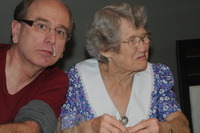
My name is
David Robins:
Christian, lead developer (resume), writer, photographer, runner,
libertarian (voluntaryist),
and student.
This is also my son David Geoffrey Robins' site.
Visiting with mom in Abbotsford
News ·Sunday March 21, 2010 @ 01:37 EDT (link)

 We just got back from Abbotsford (past 1am), heading out from Chris and Vanessa's at about 11pm. But that's still an early night for us.
We just got back from Abbotsford (past 1am), heading out from Chris and Vanessa's at about 11pm. But that's still an early night for us.
Heading out from our place earlier, we left around 11am; an accident on I-5 delayed us, and we arrived at 1405, picking up McDonald's fries first since Honey hadn't eaten (I had brought a bagel).
So let's see… I'm writing this so much later. We went to John and Sharon's condo first, and Mom was there, and we visited for a while. She had brought us (me) some Kendal Mint Cake and Turkish Delight, two of my favorite English confections, which was very kind.
The three of us decided to head out to a local British themed tea store and then a local park, and would meet up with the rest of the relatives at Chris and Vanessa's (and Graham and Wendy's—it's a big split house) later on for some Chinese takeout.


 I picked up some Cadbury's Chocolate Buttons and McVities Fruit Shortcake biscuits (cookies) at the English tea room—I wanted to get some jelly babies but they were far too dear—and then we headed to Centennial Park in Abbotsford, around Mill Lake, to walk.
We had a nice walk around the lake, returned to the car, and drove to Chris and Vanessa's.
I picked up some Cadbury's Chocolate Buttons and McVities Fruit Shortcake biscuits (cookies) at the English tea room—I wanted to get some jelly babies but they were far too dear—and then we headed to Centennial Park in Abbotsford, around Mill Lake, to walk.
We had a nice walk around the lake, returned to the car, and drove to Chris and Vanessa's.
The Chinese takeout was quite good; there was plenty to eat and good conversation, part of which was about the problem of Indian and other professionals (doctors, engineers, and so on) coming to Canada (and, by extension, the US) but their accreditation not being recognized so they end up driving cabs and having to redo education that they've already done, which is even more tragic considering the demand for such skills in Canada especially.
Books finished: Lord of Chaos.
Dr. Yaron Brook at the University of Washington
News ·Tuesday March 16, 2010 @ 23:59 EDT (link)
I went to UW tonight (parked in N5, $6, beats $10 at central) to hear Dr. Yaron Brook of the Ayn Rand Institute (ARI) speak, title Capitalism Without Guilt: The Moral Case for Freedom (link goes to previous presentation; I asked a guy taking video for this event, and it'll be up shortly). The event was arranged by the Objectivism group at UW, An Objective University of Washington (OUW).
He started at 1900, spoke for about 40 minutes then took questions until about 2100. He covered the financial crisis a little, spoke about government regulation as the root cause (e.g., banks are the most regulated sector in the US; they have to run every decision they make past the government), then generalized out to individual rights, morality, and the purpose of government: protecting individual rights. He went over the difference between real rights, which require people to leave others alone, and non-rights that people claim as rights (e.g., health care) that involve forcing others to work for you (doctors in this case), i.e., making them slaves, and thus being incompatible with freedom. He didn't give very good reasons for a minimal state (the usual "force is outside of rationality and multiple private protection agencies would fight each other absent an absolute standard"). He got several rounds of applause during the presentation and questions.
Nobody asked any questions that were that interesting to anyone that had read Rand or even basic philosophy, but that was actually encouraging since the event was billed as open to all which means unexposed people are coming and learning and perhaps thinking differently. And it's still good to hear him answer them; he's an excellent speaker.
I did like when Brook said to one guy "Stop waving your hand, you could be waving five hands and it wouldn't do any good" and then the guys says "But I want to interject" and Brook says "I don't want you to interject", hehe. Pampered liberal perhaps, used to ranting on in liberal profs' classes where they agree with him so let him drone on? He also deftly moved on from the guy in the front that wanted to monopolize the Q&A period. Crowd control, he haz it.
Books finished: Lies and the Lying Liars Who Tell Them.
More memory for cirith-ungol
News, Technical ·Monday March 15, 2010 @ 22:51 EDT (link)
I installed the memory I bought for the MythTV/XBMC machine today (cirith-ungol), 2 Gb of Kingston DDR2 667Mhz PC2-5300 "ValueRAM" that I got from NewEgg (after first buying the wrong type and RMAing it back at a loss of about $10 for restocking, balanced by a $10 git card from my previous USB HD purchase). This takes the machine to a total of 4 Gb, which was recognized immediately on bootup (but since I'd upgraded the kernel I had to rebuild the lirc and the nVidia drivers, including applying patches attached to this Gentoo bug).
This might make 720p HD movies play a little smoother; they sometimes drag a little during fast motion. The new memory chips are half the height of the old ones, which worried me at first, but they work just fine. The machine's a few years old; must be Moore's law at work.
CSEP504: second and last paper done
News, School ·Sunday March 14, 2010 @ 19:54 EDT (link)
My current course, CSEP 504, Advanced Topics in Software Systems, is over. Although it was billed as a course covering various software topics, including programming languages research, it actually ended up being a fairly run of the mill course in software architecture, and I'm glad it's over.
To start with, our professor missed a couple classes, one due to being at a conference in India, but he should have had someone cover. A few classes were taught by graduate students, so it was quite possible. When Dr. Notkin was present, he was an engaging teacher, although the classes seem to move rather excruciatingly slowly. For example, the lectures on tools: we all know about source control, and we can look up the Wikipedia pages on our own. I suppose I should have said something earlier, but after expressing a desire to examine "graduate" topics in the compilers course (vs. starting with the basics that "everyone" should have learned in undergrad, but apparently didn't, though no fault of the instructor whatsoever) and being told I was on the fringe, I had less confidence that one person is going to cause a foundational change in a class that (I thought at the time) had been mapped out well in advance (I'm rather inclined to adjust "well in advance" to "just before class time" now). But maybe I was thinking what we all were thinking.
Next, the grading was coarse-grained: 30% x 2 for two "state of the research" essays, 2% x 10 for 10 reports on papers from an assigned set on the course page, 10% participation (presumably in the online forums, since there's no way he knew everyone by sight, especially across the remote link to the Microsoft class), and another 10% was undecided (and he eventually decided to just give it to us, so I can't complain there). It was also nice not to have any exams, I suppose.
As the subject says, I just finished my second paper, 10 pages in ACM format (most students didn't follow the guidelines and just used the default Word style, with a 1.5-spaced 12 point font, making the ACM format effectively 2.5 multiplier in actual volume; sure, quality is important, but that's a lot of difference in amount of work). I am very glad to be done. My first paper was on Complex Event Processing (CEP) and my second was entitled "Market-Based Architectures" and examined a series of market and negotiation-based architectures, such as autonomic systems internally auctioning resources, or inter-agent trust and handling of proposals for work.
You'll like the course if you like to read (and report on or aggregate) papers, but I suggest you read papers on your own time and find courses in which you can learn new things. Personally I like courses with design or programming projects, such as the compilers course I had the previous quarter, which was a lot of fun. But I read a lot of papers—and learned a lot—in Accessibility, too, and that was interesting, so it's not just that I prefer to write code. Don't take this course.
More coffee, more conservatives: Coday and Widener
News, Political ·Sunday March 7, 2010 @ 18:54 EST (link)
Couple more meetings with the Puget Sound Conservative Underground thus Sunday afternoon and last, with a couple US senate candidates that are hoping to run against incumbent liberal Patty Murray. Liberal in the "progressive" sense, not the liberty sense—heck, "liberal" and "progressive" are both euphemisms: what I meant was liberal in the "rob you blind" sense, not the classical liberal (libertarian) sense.
Last week, Art Coday (February 28), at the Woodinville library. He was well-spoken; he's a doctor; he came across as very polished and willing to stand up for his beliefs. On the topic of abortion, he made no bones about being pro-life, believing life begins at conception, and justifying laws against abortion as protection the right to life of the child, drawing from the Declaration of Independence. (I'm aware there are attempts at counter-arguments, such as Thompson's violinist, but his position makes sense.) He misstated Roe v. Wade, though; it does allow states to restrict abortions after the second trimester.
I got to talk to him one on one after the group discussion and he is very much pro Second Amendment (I buttonholed him on his statement that the state should not be able to "unduly" restrict the right to bear arms and asked him what that would mean; his example of a courthouse where sufficient security is generally in place to protect people was at least cogent, even though, of course, those people are generally not protecting visitors per se, but rather judges and perhaps prosecutors, and have no duty to protect individuals, and individuals may need protection from unarmed violence or those that manage to illegally get weapons in.)
He was also open to libertarian idea such as abolishing government departments and small government, but anyone will say that. I think he'd be a good choice, but unfortunately Widener probably is easier to get elected.
Yellow-haired plump lady was there droning on and on; she seems to be a bit of a fixture; she can't get out a short direct question to save her life. There also appeared to be someone who was perhaps a union plant there? And we even had an entitlement-minded older gentleman whose only concern was "his" Social Security. I suppose it's a conservative gathering, not libertarian, so he's not really out of place. Art fell into the trap of these entitlements being what "we" have promised; I never promised any such thing, and I don't owe him a dime. Government owes him his money back with interest perhaps, but no more than it owes all of us all of our taxes back, and if it's bankrupt, then everyone loses everything, or only gets a portion back (either a percentage or pay everyone so as to equalize what everyone loses; those that would lose less than the average get nothing back).
Today, Chris Widener. He seems to be a front runner in terms of electability; he believes the "tent" should be big enough to get 51%, since you can't make policy if you're not at the table. He talks a good talk—he'll vote down spending increases even if the bills have other good things in them (even if people claim those things are "for the children"); he would like to do big things like eliminating the Department of Education and the income tax but realizes that he's only one voice and doesn't want to make any "red meat" promises that he isn't sure he can keep.
Some negatives (learned through his web site and today) are that he will still fund the wars in Iraq and Afghanistan, and would pursue similar military adventurism and projection of power in the future—he certainly wouldn't close any overseas bases—which means there's a large area of spending that he's completely blind to and won't touch. He said Campaign for Liberty was one group he had talked to, but he misclassified the libertarian non-interventionist position as isolationist; either as an error or an intentional misrepresentation it's disconcerting.
With illegal immigration, he talks a good talk but doesn't say what he'll do once the border is secured and we know who's here. His site says an ominous, ambiguous "deal in an effective manner with the millions of illegal immigrants we already have here"—if he meant deport them, then he'd say that; "deal with" could mean anything from deportation (unlikely) to a "path to citizenship". I'd like to see a clearer statement there.
I would have liked to ask him what his philosophy of taxation was—what justifies taking money from people: is it just that the government has more guns (might makes right), some sort of social contract theory; in his view does voting imply that you endorse the entire system and agree to every result? However, part of his philosophy was to call on people only once (or so he said—he called on a few ladies more than once, but I suppose I can't blame him).
Aero Precision stripped lowers group buy
News, Guns ·Saturday March 6, 2010 @ 19:46 EST (link)
KA of the Microsoft gun DL coordinated a purchase of Aero Precision AR-15 lower receivers; all told we bought about 50 as a group. (The lower receiver of a firearm is the part with the serial number and the part which is regulated as a "firearm" by the state. "Stripped" means you get just the received—no trigger assembly or other parts. Since those parts aren't regulated, they can be bought online and shipped directly to one's home to assemble a working rifle.) I bought a couple as investments (we got them for about $60 apiece; they're probably already resalable for $80, maybe $100 soon); I'll hang on to them for a while in case anti-gun legislation comes down from Obozo and his cronies and makes prices go up ridiculously.
I also picked up some Federal .22LR and some 9mm hydrashoks (as personal defense ammo, provided my guns like it, switching from Gold Dot hollowpoints) and a couple Magpul "P-Mag" AR-15 magazines with windows. I was going to go to Cabela's, since their store is only another 20 minutes down the highway, but Surplus Ammo's price for the ammo I was going to get was already cheaper than Cabela's sale price, so that saved me a trip. Last time I was there to consider a shotgun they fell through on the advertised price, anyway (didn't have any, or tried to claim it was a different model).
Surplus Ammo, the store where we got the lowers, is down in Lakewood, about an hour away (they also have a booth at the WAC gun shows, but they only sell ammunition at the shows—probably because they already do a brisk business and don't want to hold it up with NICS checks for selling firearms, or don't want to devote shelf space to firearms and accessories that might have lower profit margins or not sell as well?)
Traffic on the way back was rather miserable both on I-5N and WA-520E, but there was no sign of an accident—must have been just volume and lousy driving.
Honey's Aunt Linda is coming home from hospital, but this is not because she is coming home healed; she has been given one to six months. And now Honey's dad, who has been spending a lot of time taking care of Linda, is in hospital with chest pains, not good with a history of heart problems. We pray the doctors will be able to take care of the problem quickly and that he will be restored to full health.
I finished volume one of Philip K. Dick's selected stories on audio book in the car Friday, but I can't find an equivalent book to add to GoodReads (maybe there isn't one), although I did put a hold on volume two.
Books finished: Where Keynes Went Wrong.
Depression point
News, Political ·Monday March 1, 2010 @ 19:34 EST (link)
State Blood Milk Addiction by Stefan Molyenux really depressed me. I had been hanging on to an irrational belief that we could vote liberty in and the looters and their enablers out. But it's not possible. Too many people depend on government sinecures, pensions, indirectly created jobs (think accountants and lawyers), and of course handouts. Think federal employees (SEIU), teachers, the military; welfare and Medicaid/Medicare recipients; companies that receive most of their funding from government contracts; all of these are parasites that believe they are entitled to a continued flow of funds obtained from working people at gunpoint. And nothing you say will convince them otherwise any more than you can convince a lottery winner to tear up their ticket.
There are two possible solutions: change the culture (neither Hitler nor slavery are popular any more, but they were very much so in America in the 1930s and 1860s respectively) or violent revolution. I don't think violent revolution will be successful (we have semi-automatics, they have tanks, air support, missiles, artillery, and automatic weapons, and far more training), unless the military can be convinced to join us, but they're generally trained to be perfectly obedient killing machines (Oath Keepers may help there). But even so, that would require the first plan: changing the culture. And that's really hard, because the state controls the schools; as Hitler said, "Your child belongs to us already."
If even one state—or even one county—could break free, the whole mess would unravel. Which is why they will tighten their grip and throw down more bread and circuses. Forever.
What Niemöller might say about "arms"
Political, Guns ·Sunday February 28, 2010 @ 20:45 EST (link)
The most foolish mistake we could possibly make would be to allow the subject races to possess arms. History shows that all conquerors who have allowed their subject races to carry arms have prepared their own downfall by so doing. Indeed, I would go so far as to say that the supply of arms to the underdogs is a sine qua non for the overthrow of any sovereignty.
—Adolf Hitler
(From Reclaim America, 2010-02-25 @ 18:31, since it can't be linked to directly due to abject Facebook FAIL.)
People that replied seemed to be under the impression that they possessed, in the context of that quote, "arms", if they owned a semi-automatic pistol or rifle. They don't. The government will laugh at them and destroy them and 500 of their closest friends with a missile without bothering to get out of bed—and then blame them for any "collateral damage." We possess "arms" in the same way that a savage with a stick possesses "arms" against an enemy armed with a modern rifle. The second amendment was supposed to be about parity; but they've infringed it like all the rest (e.g., the 1934 National Firearms Act), and we didn't speak up.
When the people fear their government, there is tyranny; when the government fears the people, there is liberty.
—Thomas Jefferson
By gradual and continued infringement of the right to liberty and property, specifically, in the American context, by pulling the teeth of the Second Amendment, they have turned us into sheep; and who fears sheep? As Jefferson predicted, the government no longer fears the people and there is indeed tyranny.
Books finished: Realizing Freedom.
Unanimous vote requirement
Political ·Saturday February 27, 2010 @ 17:56 EST (link)
Would there be any negatives to requiring legislative votes to be unanimous rather than just a simple majority?
Certainly it would not be perfect—if enough horse-trading took place, they could still conspire to mulct the voters.
But it would slow the speed of government growth and spending, to be sure. It would not slow down the mechanisms in emergencies (or, at least, whoever did slow it down in those cases would be shamed and ousted). Yes, it would give nay votes more power; but (as Heinlein proposes near the end of The Moon is a Harsh Mistress) it should be harder to add new regulations and spend people's money than to not do so.
How would repeals be handled? Heinlein also proposed that repealing should be easier. For one, each and every law (or regulation, or tax—everything under federal control that coerces anyone to do anything at all) should have a sunset provision not to exceed two years (even, to avoid exceptions piling upon exceptions, things like federal murder statutes: nobody's going to oppose them, and it doesn't matter if they do because every state has laws against murder anyway). With this provision, again it only takes one no vote to repeal a law when it comes up for renewal.
If a straight repeal (with no riders whatsoever) comes before the legislature, should it still require unanimity? In defense of such a requirement is consistency, the possibility of repealing it at the sunset which will be within two years, and the fact that within the past two years largely the same group (given term lengths and the historical odds of incumbents being reelected) unanimously voted to pass it. Against it are some of the same arguments: if it required unanimity to pass a law three months ago, why does it not require unanimity to retain it—why the incongruous one-way ratchet?
I would also suggest that votes should be made all at the same time and secret until all present have voted, so that nobody need be the first no vote and take the fall for others that would vote no. (This would be a good idea now too; frequently a party will let its more conservative or liberal members—depending on the party of course—abstain or vote against a bill to help them in their districts, even if they would prefer to vote for it and will vote for similar legislation odious to their constituents when called on to do so by the party machine.)
We can take a look at past votes and see how many were unanimous or as nearly enough as to be potentially convertible. Less legislation appears to always be a positive thing. Even better would be a legislature constrained to never infringe on individual right to life, liberty, or property (of course, it would be voluntarily funded and spending would be in regard to donated funds, since taxation—force—would be impossible); and the next step would be to eliminate the body entirely.
Tea Partying in the rain
News, Political ·Saturday February 27, 2010 @ 16:12 EST (link)
Just got back from the Tea Party rally at 5th and Northgate in Seattle (1200-1400). Although it drizzled intermittently there was quite a crowd out and we were arrayed for a long way along Northgate (near the Northgate Mall).
James Watkins was there, and several people with signs for him (Matthew Burke and his wife Jennifer had a late flight so weren't able to make it), and some U.S. senate candidates too: Chris Widener and Art Coday (and a Rod Rieger who is apparently running to install audio/video equipment—if you're running for election, don't use your old business cards!)
I wasn't "feeling it" as much as before—perhaps it was the rain, but people seemed unusually dour and non-talkative. I did talk to a few people, including Gordon (above with the triangular yellow signs) and Thomas (with the Watkins sign), and saw Dan (the organizer and organizer of the "Coffee with Conservatives" meetings), but didn't see any CLAMS—shame, shame. I expected to see at least Lori C. and John D. Gird your loins!
<Previous 10 entries>



 We just got back from Abbotsford (past 1am), heading out from Chris and Vanessa's at about 11pm. But that's still an early night for us.
We just got back from Abbotsford (past 1am), heading out from Chris and Vanessa's at about 11pm. But that's still an early night for us.

 I picked up some Cadbury's Chocolate Buttons and McVities Fruit Shortcake biscuits (cookies) at the English tea room—I wanted to get some jelly babies but they were far too dear—and then we headed to Centennial Park in Abbotsford, around Mill Lake, to walk.
We had a nice walk around the lake, returned to the car, and drove to Chris and Vanessa's.
I picked up some Cadbury's Chocolate Buttons and McVities Fruit Shortcake biscuits (cookies) at the English tea room—I wanted to get some jelly babies but they were far too dear—and then we headed to Centennial Park in Abbotsford, around Mill Lake, to walk.
We had a nice walk around the lake, returned to the car, and drove to Chris and Vanessa's.